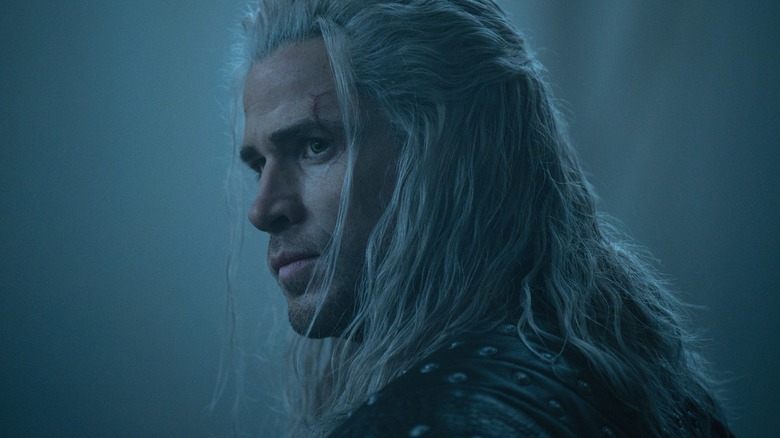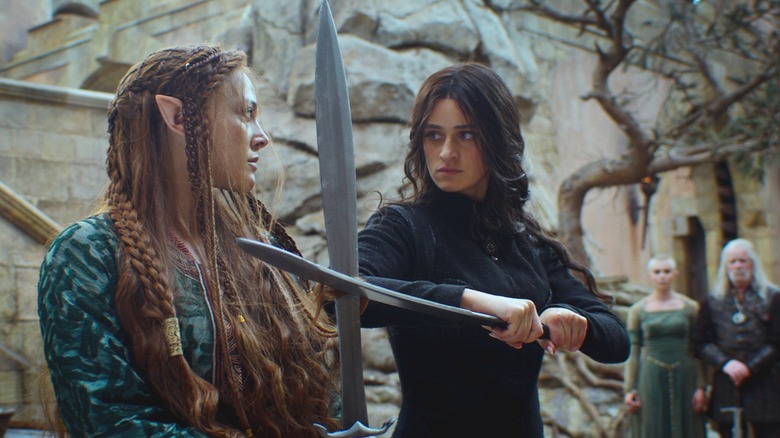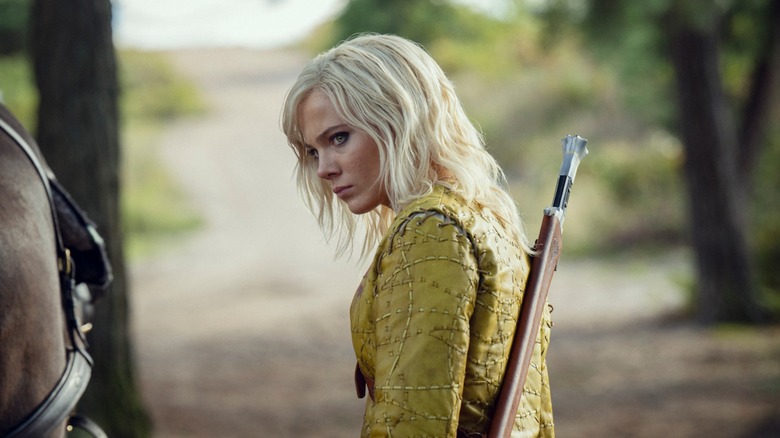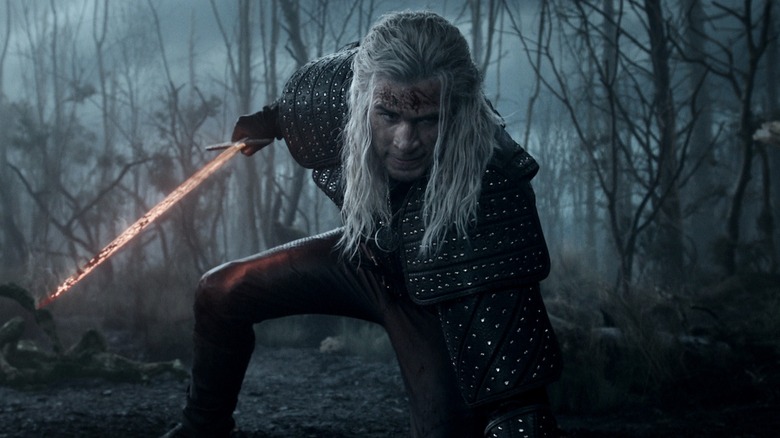The Witcher Season 4 Review: This Uneven Chapter Is The Epitome Of Squandered Potential
Netflix's "Witcherverse" has always been riddled with problems. For starters, the show's attempts to adapt Andrzej Sapkowski's "The Witcher" novel series have been inconsistent in quality, with bursts of admirable originality often overshadowed by drab, uninspired writing. Lauren Schmidt Hissrich's series struggled to find its footing in the first two seasons, but season 3 promised an exciting new direction that combined Sapkowski's intricate worldbuilding with the adaptation's burgeoning identity. While Henry Cavill's exit (as Geralt of Rivia) at the end of season 3 cast some doubts on season 4's roadmap, things got back on track with Liam Hemsworth slipping into the shoes of our beloved witcher.
This provided season 4 with the unique opportunity to start fresh, which should've worked in tandem with the borrowed goodwill from the previous season and the astounding legacy of "The Witcher" franchise. Unfortunately, season 4 of the Netflix adaptation constantly flits between praiseworthy moments and monumental blunders, and this uneven quality extends to almost every facet of the show. This utter lack of uniformity is concerning, as it bleeds into dialogue/performances as well — one moment, you're moved by an emotional confession, and in the other, every word uttered feels disconnected from Sapkowski's strange and fantastical world.
I must emphasize the fact that the new season's shortcomings have nothing to do with Hemsworth's portrayal of Geralt, as there are no deliberate attempts to alter or reinvent the character. Hemsworth does a fine job of wearing the witcher's medallion (more on that later), and the obvious distinctions in this rendition aren't necessarily detrimental to the story. Season 4's biggest problems lie in its poor understanding of Sapkowski's work, which automatically invalidates any attempt to undermine canon or steer away from it.
Season 4 of The Witcher makes some egregious, indefensible changes to canon
The latest season opens with a handy recap, which eases us back into Geralt travelling alongside Jaskier (Joey Batey) and Milva (Meng'er Zhang), who are on their way to Nilfgaard. Sapkowski's "Baptism of Fire" sets up this journey as a dangerous one, and the series faithfully replicates that in essence, albeit with far less tact or nuance. On the flipside, we have Yennefer (Anya Chalotra) portalling across the Continent in search of powerful allies, which culminates in an inevitable confrontation with the conniving Vilgefortz (Mahesh Jadu) at Montecalvo. Meanwhile, the end goal of Geralt and Yen's desperate efforts, Ciri (Freya Allan), has now taken the moniker of Falka, having embraced a violent, morally-dubious existence alongside the Rats.
As the series weaves these threads together, major changes are made to canon. Now, no adaptation worth its salt is a 1:1 recreation of its source material, as it needs to forge its own identity in the process. But "The Witcher" season 4 makes some inexcusable decisions in terms of character fates: major characters are killed off way too early and robbed of their narrative purpose, and integral character moments are transposed for no reason whatsoever. Nothing in Sapkowski's novels happens in a vacuum, as every action is tied to the fate of the Continent, which is currently embroiled in war. Yet, season 4 presents key events as isolated incidents without dissecting their impact on a socio-political scale, leading to a defanged interpretation of canon.
Montecalvo was never meant to be an indestructible stronghold, but this fresh development seems promising at first, as it affords Yennefer and her mage allies a compelling chance to destroy Vilgefortz and rebuild what they've lost after Aretuza's fall. While the climactic clash feels kinetic in bits and pieces, it comes at the cost of the complex motivations that the Lodge of Sorceresses embody in the books (and in Projekt CD Red's "The Witcher 3: Wild Hunt"). Everyone from Fringilla (Mimî M. Khayisa) to Philippa (Cassie Clare) suddenly feels one-dimensional, as their actions are completely divorced from the political maneuvering established in the previous seasons.
The merits of Witcher 4 are regrettably marred by its inconsistent storytelling
Not everything about this season is frustrating. While the Rats storyline isn't exempt from poor writing moments, the emotional heft of this arc ultimately pays off as it accomplishes what it sets out to do. Ciri is supposed to be unrecognizable this season, as she is the farthest from the princess Geralt found at the edge of Brokilon. Allan has consistently been a standout, and she carries this mantle with genuine verve in this new chapter, where we see Ciri's humanity erode and almost be erased over time. The crux of this arc is Leo Bonhart (Sharlto Copley), who embodies the chillingly unpredictable villainy that his book counterpart has always been known for. While we don't see much of Bonhart, the finale puts him in Ciri's proximity to etch a traumatic turning point for our character.
Season 4 also excels in monster design, bringing various beasts to life without strictly adhering to the franchise's canonical bestiary. Surprisingly, this aspect works, paving the path for some excellent fight choreography that is also complemented by decent monster lore (some of which genuinely tug at the heartstrings). Mournful wraiths make homes out of graveyards, and tragic entities haunt the Ysgith swamp — these moments remind us why "The Witcher" appeals to our thirst for fantasy tropes within a grounded backdrop in the first place.
A slew of new characters are introduced, including the kind-hearted Regis (Laurence Fishburne), the shrewd Skellen (James Purefoy), and the boisterous Zoltan (Danny Woodburn). These iterations are serviceable enough, even though they're severely flattened by the story (the only exception being Skellen, thanks to Purefoy's dynamic performance). There are also glimmers of brilliance here, especially in a brief animated sequence that spells out an origin story so vivid and multifaceted that you might start wondering whether "The Witcher" has always been better suited to a non-live-action medium.
Liam Hemsworth's Geralt should be the least of your concerns when it comes to The Witcher
Acclimating to a new version of a character can be difficult, but Hemsworth's Geralt doesn't stick out like a sore thumb, at least from a tonal standpoint. If anything, he's much closer to the physical description of Geralt in the books/games, sporting a more agile fighting style that leverages a lean, muscled physique. In terms of emotionality, this Geralt is supposed to be more open, as this change already takes place at the end of season 3, where Geralt sheds his guarded neutrality.
This means less grunting and one-word quips, where he needs to extend trust to a big group of allies, including those like Cahir (Eamon Farren), who have wronged Ciri in the past. Hemsworth does a good job of balancing Geralt's vicious physicality with his ongoing emotional flux, which allows the character to grow and evolve with the narrative.
That said, the series' writing discrepancies reflect on every character, including Geralt, and how we perceive him. This is why he's compelling in some scenes and completely unconvincing in others — this also extends to his immediate companions, who alternate between eliciting endearment and annoyance. Moreover, very few performances feel cohesive this season, but exceptions include Bart Edwards' Emhyr (who is now consumed by corrupted overreaching) and Graham McTavish's Dijkstra (who is criminally under-utilized and sidelined). Even Chalotra's Yennefer falls prey to this lack of cohesion, where she's seen channelling a vibrant cocktail of emotions into one scene and appearing completely disengaged from her immediate circumstances in the next.
"The Witcher" sets up some major book moments in the end, but the impact of these familiar stakes feels dull, like a weapon that hasn't been sharpened in ages. The potential inherent in Sapkowski's world is immense, but the Netflix adaptation squanders it with season 4, which is the weakest entry in the franchise so far. Maybe we do need to toss a coin to the witcher, as we've left the Valley of Plenty far, far behind.
/Film Rating: 5 out of 10
"The Witcher" Season 4 premieres on October 30, 2025, on Netflix.



